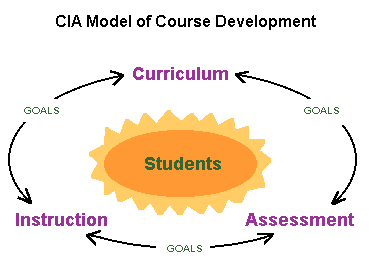Assessment Ideas
Assessing student learning is an important area of instruction. As many people are having to rethink assessment options right now, it is important to make choices that will serve you and your students well. Keep in mind that your colleagues are great sources of ideas also, both at U of R and at other institutions. This is especially true for discipline-specific challenges.
Think of good teaching as a closely linked cycle of your goals, your assessments and your instruction. Start with your goals, then choose assessments that will achieve those goals, then design your instruction to get students prepared for those assessments.

It will be helpful for your students if the final assessment you choose has some similarity to other course assessments they have already completed. Changing assessment types completely at the end of the semester makes it difficult to get an accurate measure of your students’ learning. For example, if previous assessments have included online exams, it may mean ensuring that a portion of your ‘new’ final consists of some online exam questions, and a take-home paper or another type of alternative assessment..
The questions below can assist you in choosing an assessment that will work for you (based on the work of CITL):
-
Is the assessment to provide feedback for improvement during a course, to count towards a portion of the final grade, or to give an end grade in a course?
-
Do you want to assess your students’ acquisition of specific content knowledge, or their ability to apply that knowledge to new situations (or both)?
-
Do you want to assess a product that students produce, or the process they went through to produce it, or both?
-
Do you want to assess any of the following?
- writing ability
- speaking skills
- mathematical ability
- creativity
- use of information technology
- ability to think critically
-
Some additional questions:
- Is a visual component to the assessment necessary or desirable?
- Is the ability for students to work in a group an important component of the assessment?
- Is it important that the assessment be time-constrained?
Regardless of what assessment you choose, it will still require an understanding of cheating and strategies you can use to mitigate it. See our resources on Addressing Cheating for more information.
Assessment Types
Assessments, when tied to course content, decrease the risk of cheating and increase the authentic assessment of learning. Quizzes and exams are a common standard for many but it is worth considering other options also as they may offer more flexibility for students who are dealing with limited or no access to computers, phones, reliable internet, etc. Consider whether your assessment requires you or students to access specific software or hardware, and what options may be most available and cost effective.
The following list is obviously not exhaustive, but might spark some ideas that you can look into further. Consider using a combination of these ideas to gather information about your students’ level of learning.
Familiar Options
*It is assumed that this is a sufficiently familiar option that no resources are provided.